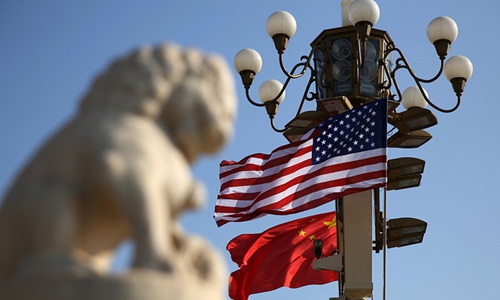HOME >> SOURCE
China, US can’t put easing trade tension in reverse amid epidemic
Source:Global Times Published: 2020/2/5 21:28:45

File photo
Just a few weeks ago, global investors were cheering the pause in the multi-year trade war between China and the US that had roiled markets around the world. That jubilation now appears to have been short lived, as the world economy grapples with fresh risks to the hard-won phase one agreement and widely-expected tough negotiations for a possible second deal.
As has been the case throughout the trade war, the renewed risks and uncertainty come from Washington, where officials mounted a rather disturbing and contradictory response to the coronavirus epidemic which has drawn Beijing's ire and called into question US sincerity in the trade talks and its intention to uphold its side of the bargain.
Following what Chinese officials call overreaction to the outbreak of the novel coronavirus that has spread fear, discrimination and even panic, US officials have shifted attention to trade issues. The White House's top economic adviser Larry Kudlow on Tuesday said that an "export boom" in the US from the trade deal might be delayed because of the "Chinese virus." In his interview with Fox Business Network, Kudlow did not explicitly question or blame China for the possible delay.
But a report from the US-China Economic and Security Review Commission on Tuesday said that the ongoing coronavirus outbreak may impact China's "ability and willingness" to meet its commitments in the phase one trade agreement.
Under the deal, China committed to increase imports from the US by $200 billion based on 2017 figure over the next two years.
Now, given that China has been struggling to fight against the outbreak of the deadly virus, which is expected to deal a major blow to the economy, it is an undeniable possibility that China might not be able to increase imports from the US, at least in the short term.
But it's important to note that this is not because China is deliberately unwilling to fulfill its commitments. The agreed upon figure for China's increase in purchases of US imports covers a two-year period. Even now China could meet that target, once the epidemic is reined in.
Even if China is unable to reach that goal, there is still a sensible path forward without jeopardizing the agreement and the negotiation process. The phase one agreement clearly stated that the two parties would consult with each other, "in the event that a natural disaster or other unforeseeable event outside the control of the Parties delays a Party from timely complying with its obligations under this Agreement." Without doubt the epidemic fits this scenario.
It is also important to point out that under phase one as part of the trade negotiations, the US is committed to rolling back tariffs on Chinese products in phases and not impose new ones. The recent tone from Washington raises serious questions about whether the US will keep this promise.
On Monday, the US Commerce Department finalized a new rule that would allow the US to impose tariffs on products from countries it deems to have undervalued their currencies against the US dollar, including China, according to Reuters.
Any new tariffs on Chinese products based on such reasoning will certainly meet the wrath of Chinese officials and draw stern responses from China for violating US' phase one commitments and overturning its previous decision to remove China from the list of currency manipulators. Such a move would certainly put the phase one agreement and second phase talks at grave risk.
It seems too much to ask the US government to show any sympathy and understanding during such a critical time in China, given its over-the-top responses that included the ghoulish suggestions that the virus would be good for the US and result in bringing jobs back to the county.
We merely ask the US to strictly adhere to its commitment and work with China to keep alive the thawing trend in bilateral trade tensions within the parameters of phase one agreement. Risking the deal and further negotiations will definitely not create an "export boom" in the US. It only risks putting the Chinese and US economies and the world economy into very deep trouble.
Posted in: GT VOICE